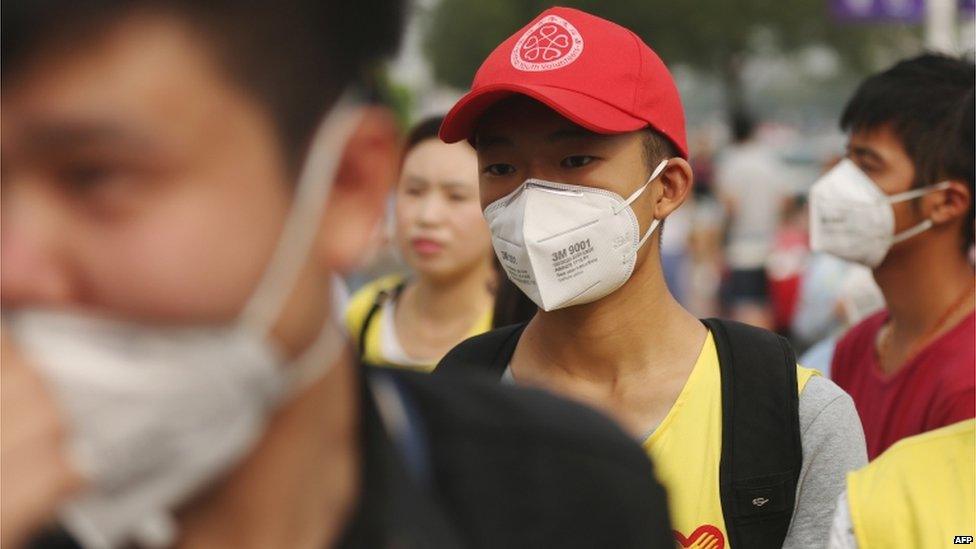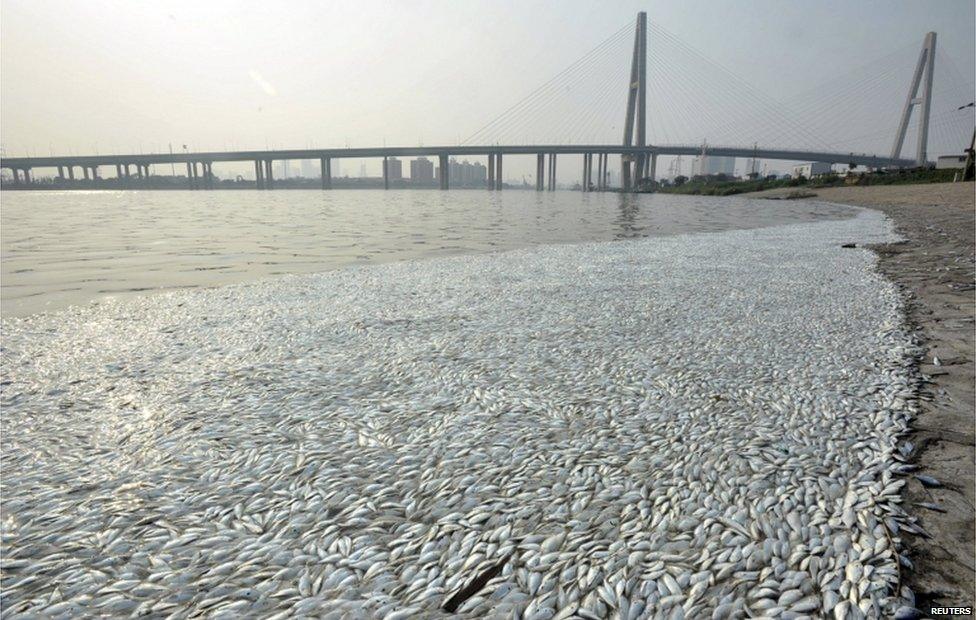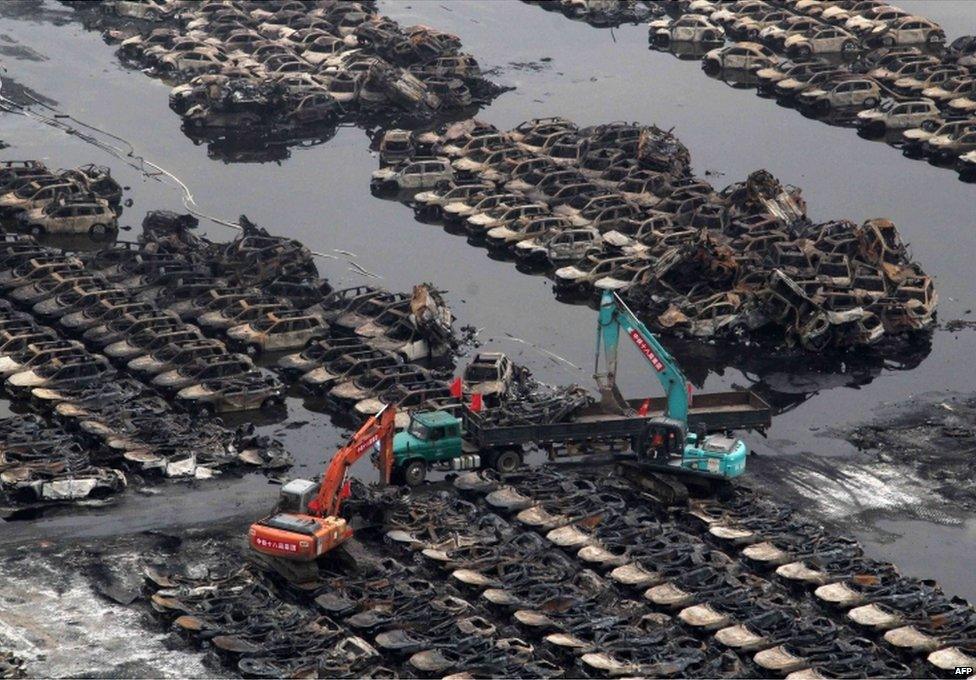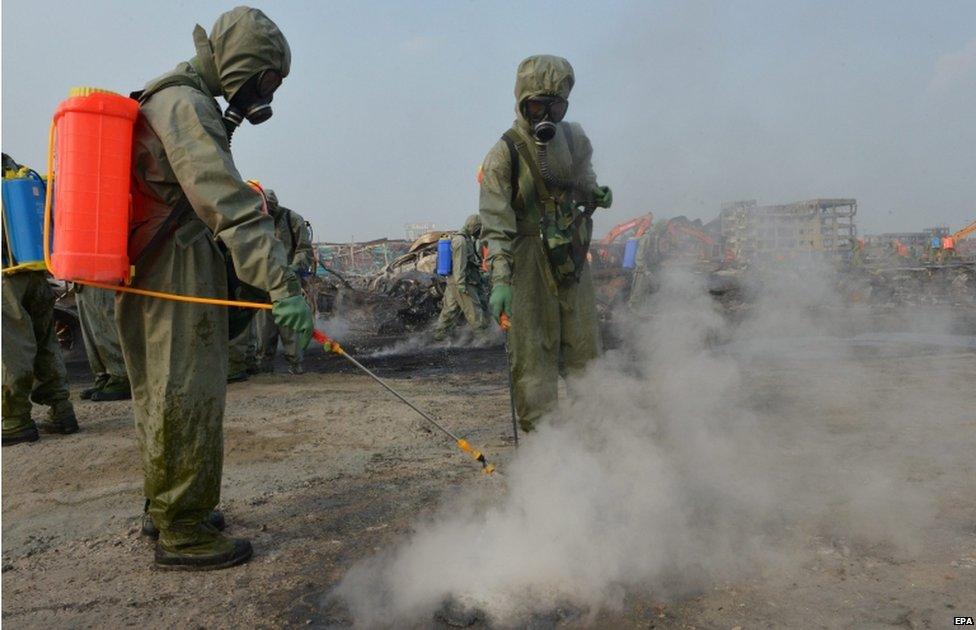How safe is Tianjin after explosions?
- Published

Tianjin residents have expressed concern about contamination
More than a week after a warehouse packed with hazardous chemicals exploded in the Chinese city of Tianjin, many are still scared that poisons lurk in the air, the ground or the water.
"It smelled strange when it rained yesterday," one Tianjin resident wrote online. "And I've been coughing for days. If the reports are true that there is nerve gas here, I'll wear a mask."
"Everyone living in Tianjin should avoid tap water," warned another. "Even if they say the pollutants have been contained, better safe than sorry."
How many of these worries are accurate? Is Tianjin still in danger? The short answer: we still don't know.
Forty chemicals were said to be in the warehouse, but the full list of chemical names has not been released.
The government says that the person in charge of warehouse logistics is too badly injured to speak, making it difficult to know exactly what was inside the warehouse at the time of the blast.
"No one knows for sure," explains Louie Cheng, a former chemical warfare expert with the US military who now runs an environmental health consultancy in China.
"They're mostly using records of what was known to have been in the warehouse. And we may never know what all was there. So, I can't say for sure if something is safe or not."

Dead fish

On Thursday, thousands of dead fish washed up on the banks of the Haihe River in the same district as the warehouse which exploded, sparking concerns online of mass contamination.
Officials said, however, that they had not found higher-than-average levels of cyanide in the water in the area.
They added that tests found there were low levels of oxygen in the water, indicating that the fish had died from hypoxia, which is the deprivation of oxygen.

Toxins posing a long-term threat, including potent carcinogens, could have been spread by the blasts.
Mr Cheng has been dealing with phone calls from worried customers living in Tianjin. "The questions that they're typically asking are: is it safe for us to be here? What are the long-term effects? Is it in the water? By and large, it comes down to: is it safe or not?"
He's advising his clients to stay indoors for the next two weeks, and to use carbon-based air filters and masks that offer better protection against chemical exposure.
But here's some heartening news: many of the major chemicals known to be involved in the explosion don't pose a long-term threat to the region.

Workers have been disposing of damaged cars at the blast site
Take sodium cyanide, the chemical that's at the top of most people's list of concerns.
Just a small amount of sodium cyanide can be fatal to humans. When exposed to water, the white powder form of the chemical converts to a gas used in chemical warfare.
However, below that toxic red line, tiny amounts of sodium cyanide are not dangerous to humans, explains Ben Burke, a post-doctoral fellow in the department of chemistry at the University of Hull.
"It will cause an immediate effect and you'll know it's happening straight away," Mr Burke explains.
"You're either going to get too much of a dose, and you're going to realise there's a serious problem, or you're going to recover quite quickly."
The risk remains that sodium cyanide will enter Tianjin's water supply. So far, tests have shown the water is safe, officials say.
"It's easily detectable if sodium cyanide shows up in the water," Mr Burke says. "It will be immediately clear."

Soldiers have been spraying hydrogen peroxide to neutralise sodium cyanide residue
For some of the chemicals known to be in the warehouse, the biggest danger they posed was the threat of explosion. Calcium carbide, for example, would have been safely dispersed into the atmosphere after the explosion.
Mr Burke is careful to acknowledge the seriousness of the accident, and the suffering to the victims and their families. However, he wants to assure Tianjin residents that it's possible for the area to recover.
"Some of this is a problem of general chemophobia," he says. "People are scared of chemicals and chemical names. And what do you mean by a hazardous chemical?"
"Everything is hazardous; it all just depends on the dose. Every chemical in the world is hazardous if you take it in the wrong way or you take too much of it."
Mr Burke says the site can "almost definitely" be made safe again, judging by the chemicals that are known to have been released.
'Long and painful'
So, how will crews clean up the mess?
Three hundred military chemical experts are engaged in the clean up operation. Wearing biohazard suits and masks, they've been using heavy machinery to build a large wall of earth and sand around the site. The wall should help prevent the chemical from spreading.
They're also dousing the scene with hydrogen peroxide, a chemical that can neutralise sodium cyanide. But they still have a long way to go: state media reports that cyanide levels inside the zone are 356 times higher than levels considered safe.
One cyanide manufacturer sent a team of 140 people to help retrieve the chemical and send it back to its production site in nearby Hebei province.
Mr Cheng is blunt when asked about the clean up, predicting it will be "long and painful."
"Unless the government were to entomb the whole area underground and [keep it] air and water tight, they would need to clear it building by building to neutralise and remove remaining chemical stocks."
According to Chinese officials, the clean up will take three months.
Those made homeless by the blasts have been offered three months of living expenses from the government as part of an initial compensation package.
However, many are refusing to ever return to their former homes.